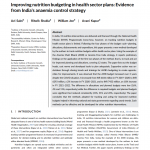
How Honest is Honest?
24 October 2016
Before one sets in place a system of 360 degree appraisal and expects it to work effectively, two pre-requisites have to be in place. First, there must be a shared understanding of what integrity is and second, there must be a culture of acceptance of honest criticism up the hierarchy. Both are sadly lacking in the government.
One of the key questions in the system of performance appraisal in the government – the Annual Confidential Report system – is regarding the integrity levels of the officer being appraised. This is the question for which the blandest answer is almost always the norm. The safest thing to do, as I have written before, is to write the words ‘Beyond reproach’, which usually translates into ‘What? I did not see that question’. Yes, while those appreciative but lacking in knowledge of grammar may write ‘fully integrated’, or the sneaky may write ‘he conducts experiments with the truth’, nobody writes things they might actually want to say, in that column.
Let’s explore the idea of a shared understanding of what comprises integrity in the government, a bit more by considering the scenarios described below.
- An officer routinely uses his official car to go to a private club on the way home and stays there late, playing cards, whilst his driver waits outside, without being paid overtime.
- Marshy government land, which is considered useless, is arranged to be granted to the club by the officer, to set up a golf course. Officers of the civil services are given fast track membership into the club, on the payment of a concessional fee.
- An officer knows her minister is making money by interfering in postings and transfers of officials below her. The task of undertaking transfers has been always with officers, but slowly, the minister has taken over by demanding to see the files on transfers. The officer shrugs her shoulders, says that things have gone seriously wrong in the government, and looks away.
- An officer working in the local government allows the members and corrupt engineers to make some money on contracts for roads, but on the tacit understanding that she be left alone to run a corruption free programme for supporting farmers with training and technical inputs for water harvesting. This in turn ensures that the officer is not moved out and that the programme benefits a large number of people.
- An officer has a reputation for austerity and honesty of a high degree. Wherever the officer is posted, she investigates who is dishonest and proactively collects evidence against such people. She then submits petitions to higher level governments against such people. She often leaks such reports to the press and gains a reputation as a David, who slays the Goliaths of corruption. The problem is that she is transferred within a few months in each of her jobs and she never stays long enough to complete any of her missions.
I am not going to attempt to analyse or provide answers as to whether the behaviour of the protagonist in each situation comprises behaviour of high, or low integrity. However, these situations (and many more that are similar) paint a picture of many hues. We are led to realise that in reality, standards of integrity are not precise or universal, but are made up at the nick of the moment, as circumstances unravel.
It is not as if the government does not do anything to define standards of integrity. However, documents that aim to do so are usually verbose and vague. Typically, the conduct rules which lay down the rules for official and personal conduct of Government staff, do not keep pace with the circumstances of the day.
Catch all phrases such as ‘conduct unbecoming of an officer’ can be subjectively interpreted to apply personal biases as to what is acceptable and what is not, whilst judging an officer’s behaviour. For example, whilst arriving at one’s workspace in an inebriated state would be a definite no-no, drinking off hours in a private bar might, or might not, be considered as behaviour unbecoming of an officer. The exceptions to the rules are also capable of being widely misinterpreted. For instance, while the rule that an officer ought not to communicate with the media without permission is easy to understand and apply, the exception that applies to expressions that are of an artistic or literary nature has been used as a window to express oneself on social media. That would be fine if one were writing about one’s hobby or publishing a work of fiction, but when an officer of the government takes sides in a political argument through Facebook or Twitter, it might become decidedly iffy.
Clearly, it is safe for an appraising officer, whether in a supervisory capacity or in a subordinate role, to write that the officer being appraised is Beyond Reproach. Much safer than saying that he is a Rotten Egg.





